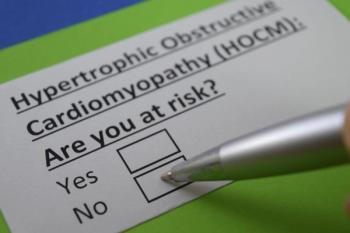
FDA OKs Vericiguat for Patients With Heart Failure and Reduced Ejection Fraction
The FDA has approved vericiguat (Verquvo; Merck) for use in patients with chronic heart failure (HF) and ejection fraction less than 45%.
Officials with the FDA have approved vericiguat (Verquvo; Merck) for use in patients with chronic heart failure (HF) and ejection fraction less than 45%.
Vericiguat, a soluble guanylate cyclase (sGC) stimulator, is now indicated to reduce the risk of cardiovascular disease (CVD) and HF hospitalization following hospitalization for HF or need for outpatient intravenous (IV) diuretics. Vericiguat should not be administered to pregnant women because it may cause feta harm, according to a boxed warning on the label.
The approval is based on clinical data from the VICTORIA trial. The primary efficacy objective was to determine whether vericiguat is superior to placebo, both in combination with other HF therapies, in reducing CV death or HF hospitalization in 5050 adults with symptomatic chronic HF and ejection fraction less than 45% following a worsening HF event. A worsening HF event was defined as HF hospitalization within 6 months or less prior to randomization. The median follow-up for the primary end point was 11 months.
Patients in the study received up to the target maintenance dose of vericiguat 10 mg once daily or matching placebo. Therapy was initiated at vericiguat 2.5 mg once daily and increased in approximately 2-week intervals to 5 mg once daily and then 10 mg once daily, as tolerated. Placebo doses were similarly adjusted. Ninety percent of patients in both the vericiguat and placebo groups were treated with the 10 mg target maintenance dose after approximately 1 year.
Results showed that vericiguat met the primary efficacy objective based on time-to-event analysis (hazard ratio [HR]: 0.90, 95% confidence interval [CI], .82-.98; p=.019). The data also determined a 4.2% reduction in annualized absolute risk with vericiguat compared with placebo. Therefore, 24 patients would need to be treated over an average of 1 year to prevent 1 primary end point event, according to Merck.
Vericiguat also demonstrated an adverse effect (AE) profile similar to placebo. Most commonly reported AEs with vericiguat included hypotension and anemia.
“Patients with symptomatic chronic heart failure and reduced ejection fraction have a high risk for hospitalization after experiencing symptoms of heart failure requiring outpatient IV diuretic treatment or hospitalization,” study chair Paul W. Armstrong, MD, FESC, FACC, FRCP, cardiologist and distinguished university professor of medicine at the Canadian VIGOUR Centre, University of Alberta, said in a statement. “By some estimates, more than half of these patients are rehospitalized within a month of discharge due to a worsening event and approximately 1 in 5 die within 2 years. The approval of Verquvo provides doctors, health care professionals, and patients with a welcome new option to current available therapies.”
Reference
- Merck Announces US FDA Approval of VERQUVO (vericiguat). News release. Merck; January 20, 2021. Accessed January 20, 2021.
https://www.merck.com/news/merck-announces-u-s-fda-approval-of-verquvo-vericiguat/
Newsletter
Pharmacy practice is always changing. Stay ahead of the curve with the Drug Topics newsletter and get the latest drug information, industry trends, and patient care tips.























